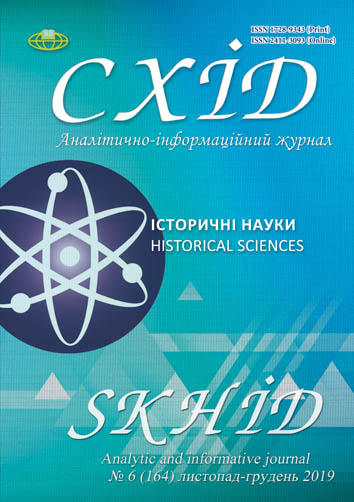Formation and implementation of the migration legislation of Ukrainian citizens to Belarus, Moldova and Russia (1991-2013)
DOI:
https://doi.org/10.21847/1728-9343.2019.6(164).185951Keywords:
migration, migration policy, migration legislation, migration processesAbstract
The article reflects the rulemaking and legislative regulation of the migration sphere in the region, based on a common documentary basis, which is the basis of the national legislation of the studied countries - the legal provisions of the Soviet period. Another source of international law is the common international norms developed within the framework of universal and specific interstate structures (UN, IOM, ILO, etc.). The process of formation and improvement of migration legislation in the Republic of Belarus, the Republic of Moldova, the Russian Federation and Ukraine continued throughout the study period. Its basic elements include the creation of a regulatory framework for general issues that indirectly dealt with migration issues and address specific issues of a purely migration area. Its results were in accordance with general norms and democratic principles. The article focuses on the migration concepts of each of the countries studied. It is concluded that the nature and magnitude of the migration movement of Ukrainians within the studied region are distinguished by the specificity of the respective migration space. It is based on strong cultural and historical ties between actors and is reinforced by the migration laws of Belarus, Moldova, Russia and UkraineReferences
Bessa Vilela, N., & Brezovnik, B. (2018). Europe: hell or paradise? An overview of European law and case law. Journal of Comparative Politics, 11(2), 65-82.
Blakar, R. M. (1979). Pragmalinguistics. Mouton: The Hague-Paris.
Buzan, B., Waever, Ü., DeWilde, J. (1998). Security: A New Framework for Analysis. Boulder CO: Lynne Rienner, 241 р.
Carles-Berkowitz, I. (2015). What Does the Law Do for Gender: Migrant Women in the European Legislation. Droit Et Cultures, 69, 113-123.
Castles, S. and Miller, M. (1993). The Age of Migration: International Population Movements in the Modern World. London: Macmillan, 420 р.
Hansen, R. (1999). Citizenship, democracy and justice in the new Europe. Canadian Journal of Political Science-Revue Canadienne De Science Politique, 32(2), 399-400. DOI: https://www.doi.org/10.1017/s0008423900010726
Hoerder, D. (2002). Migration and migrants in historical perspective. Permanencies and innovations. European Journal of Migration and Law, 4(1), 145-147. DOI: https://www.doi.org/10.1023/a:1014366301644
Ivakhnyuk, I. V. (2008). Migration policy of Russia: new initiatives. Bulletin of the Chelyabinsk State University. Series: Economics. Issue. 16: 81.
Komarova, E. V. (2019). Situation and Text: Representation of Migrants Whilst the Escalation of Refugee Crisis in Great Britain as Compared to Russia. Journal of Research in Applied Linguistics, 10, 80-91. DOI: https://www.doi.org/10.22055/rals.2019.14677
Kozykina, N. V. (2010). Teoretiko-metodologicheskiye podkhody k izucheniyu mezhdunarodnoy migratsii: kontseptsiya «migratsionnykh sistem». Vestnik ChitGU. No 10 (67): 82 (In Russian).
Kuznetsova, I., & Round, J. (2019). Postcolonial migrations in Russia: the racism, informality and discrimination nexus. International Journal of Sociology and Social Policy, 39(1-2), 52-67. DOI: https://www.doi.org/10.1108/ijssp-08-2018-0131
Ruz, C. (2015). The battle over the words used to describe migrants. BBC News. URL: http://www.bbc.com/news/magazine-34061097
Schenk, F. B. (2001). Mental maps: the construction of geographical space in Europe from the Enlightenment to the present day. Novoe Literaturnoe Obozrenie. Issue 52: 42-61.
Shenk, F. B. (2019). Transcontinental migration gatewaysas places of modernity. Vestnik Permskogo Universiteta-Istoriya-Perm University Herald-History, 44(1), 114-128. DOI: https://www.doi.org/10.17072/2219-3111-2019-1-114-128
Sredanovic, D., & Stadlmair, J. (2018). Introduction: trends towards particularism in European citizenship policies. Journal of Contemporary European Studies, 26(1), 1-11. DOI: https://www.doi.org/10.1080/14782804.2018.1436531
Downloads
Published
How to Cite
Issue
Section
License
Copyright (c) 2019 Maryna Frotveit

This work is licensed under a Creative Commons Attribution-NonCommercial-NoDerivatives 4.0 International License.
1. Authors bear responsibility for the accuracy of facts, quotations, numbers and names used.
2. Manuscripts are not sent back.
3. The publisher does not always agree with the authors' opinion.
4. The authors reserve the right to authorship of the work and pass the first publication right of this work to the journal under the terms of a Creative Commons Attribution Non-Commercial License, which allows others to freely distribute the published research with the obligatory reference to the authors of the original work and the first publication of the work in this journal.
5. The authors have the right to conclude separate supplement agreements that relate to non-exclusive work distribution in the form in which it has been published by the journal (for example, to upload the work to the online storage of the journal or publish it as part of a monograph), provided that the reference to the first publication of the work in this journal is included.

